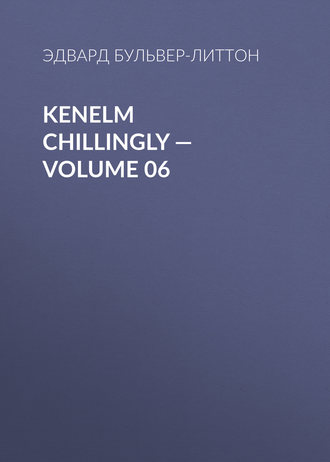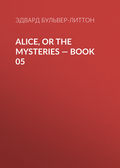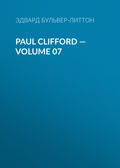
Эдвард Бульвер-Литтон
Kenelm Chillingly — Volume 06
CHAPTER X
"AND how is your good man, Mrs. Haley?" said the vicar, who had now reached the spot on which the old woman stood,—with Lily's fair face still bended down to her,—while Kenelm slowly followed him.
"Thank you kindly, sir, he is better; out of his bed now. The young lady has done him a power of good—"
"Hush!" said Lily, colouring. "Make haste home now; you must not keep him waiting for his dinner."
The old woman again curtsied, and went off at a brisk pace.
"Do you know, Mr. Chillingly," said Mr. Emlyn, "that Miss Mordaunt is the best doctor in the place? Though if she goes on making so many cures she will find the number of her patients rather burdensome."
"It was only the other day," said Lily, "that you scolded me for the best cure I have yet made."
"I?—Oh! I remember; you led that silly child Madge to believe that there was a fairy charm in the arrowroot you sent her. Own you deserved a scolding there."
"No, I did not. I dressed the arrowroot, and am I not Fairy? I have just got such a pretty note from Clemmy, Mr. Emlyn, asking me to come up this evening and see her new magic lantern. Will you tell her to expect me? And, mind, no scolding."
"And all magic?" said Mr. Emlyn; "be it so."
Lily and Kenelm had not hitherto exchanged a word. She had replied with a grave inclination of her head to his silent bow. But now she turned to him shyly and said, "I suppose you have been fishing all the morning?"
"No; the fishes hereabout are under the protection of a Fairy,—whom I dare not displease."
Lily's face brightened, and she extended her hand to him over the palings. "Good-day; I hear aunty's voice: those dreadful French verbs!"
She disappeared among the shrubs, amid which they heard the thrill of her fresh young voice singing to herself.
"That child has a heart of gold," said Mr. Emlyn, as the two men walked on. "I did not exaggerate when I said she was the best doctor in the place. I believe the poor really do believe that she is a fairy. Of course we send from the vicarage to our ailing parishioners who require it, food and wine; but it never seems to do them the good that her little dishes made by her own tiny hands do; and I don't know if you noticed the basket that old woman took away,—Miss Lily taught Will Somers to make the prettiest little baskets; and she puts her jellies or other savouries into dainty porcelain gallipots nicely fitted into the baskets, which she trims with ribbons. It is the look of the thing that tempts the appetite of the invalids, and certainly the child may well be called Fairy at present; but I wish Mrs. Cameron would attend a little more strictly to her education. She can't be a fairy forever."
Kenelm sighed, but made no answer.
Mr. Emlyn then turned the conversation to erudite subjects, and so they came in sight of the town, when the vicar stopped and pointed towards the church, of which the spire rose a little to the left, with two aged yew-trees half shadowing the burial-ground, and in the rear a glimpse of the vicarage seen amid the shrubs of its garden ground.
"You will know your way now," said the vicar; "excuse me if I quit you: I have a few visits to make; among others, to poor Haley, husband to the old woman you saw. I read to him a chapter in the Bible every day; yet still I fancy that he believes in fairy charms."
"Better believe too much, than too little," said Kenelm; and he turned aside into the village and spent half-an-hour with Will, looking at the pretty baskets Lily had taught Will to make. Then, as he went slowly homeward, he turned aside into the churchyard.
The church, built in the thirteenth century, was not large, but it probably sufficed for its congregation, since it betrayed no signs of modern addition; restoration or repair it needed not. The centuries had but mellowed the tints of its solid walls, as little injured by the huge ivy stems that shot forth their aspiring leaves to the very summit of the stately tower as by the slender roses which had been trained to climb up a foot or so of the massive buttresses. The site of the burial-ground was unusually picturesque: sheltered towards the north by a rising ground clothed with woods, sloping down at the south towards the glebe pasture-grounds through which ran the brooklet, sufficiently near for its brawling gurgle to be heard on a still day. Kenelm sat himself on an antique tomb, which was evidently appropriated to some one of higher than common rank in bygone days, but on which the sculpture was wholly obliterated.
The stillness and solitude of the place had their charms for his meditative temperament; and he remained there long, forgetful of time, and scarcely hearing the boom of the clock that warned him of its lapse.
When suddenly, a shadow—the shadow of a human form—fell on the grass on which his eyes dreamily rested. He looked up with a start, and beheld Lily standing before him mute and still. Her image was so present in his thoughts at the moment that he felt a thrill of awe, as if the thoughts had conjured up her apparition. She was the first to speak.
"You here, too?" she said very softly, almost whisperingly. "Too!" echoed Kenelm, rising; "too! 'Tis no wonder that I, a stranger to the place, should find my steps attracted towards its most venerable building. Even the most careless traveller, halting at some remote abodes of the living, turns aside to gaze on the burial-ground of the dead. But my surprise is that you, Miss Mordaunt, should be attracted towards the same spot."
"It is my favourite spot," said Lily, "and always has been. I have sat many an hour on that tombstone. It is strange to think that no one knows who sleeps beneath it. The 'Guide Book to Moleswich,' though it gives the history of the church from the reign in which it was first built, can only venture a guess that this tomb, the grandest and oldest in the burial-ground, is tenanted by some member of a family named Montfichet, that was once very powerful in the county, and has become extinct since the reign of Henry VI. But," added Lily, "there is not a letter of the name Montfichet left. I found out more than any one else has done; I learned black-letter on purpose; look here," and she pointed to a small spot in which the moss had been removed. "Do you see those figures? are they not XVIII? and look again, in what was once the line above the figures, ELE. It must have been an Eleanor, who died at the age of eighteen—"
"I rather think it more probable that the figures refer to the date of the death, 1318 perhaps; and so far as I can decipher black-letter, which is more in my father's line than mine, I think it is AL, not EL, and that it seems as if there had been a letter between L and the second E, which is now effaced. The tomb itself is not likely to belong to any powerful family then resident at the place. Their monuments, according to usage, would have been within the church,—probably in their own mortuary chapel."
"Don't try to destroy my fancy," said Lily, shaking her head; "you cannot succeed, I know her history too well. She was young, and some one loved her, and built over her the finest tomb he could afford; and see how long the epitaph must have been! how much it must have spoken in her praise and of his grief. And then he went his way, and the tomb was neglected, and her fate forgotten."
"My dear Miss Mordaunt, this is indeed a wild romance to spin out of so slender a thread. But even if true, there is no reason to think that a life is forgotten, though a tomb be neglected."
"Perhaps not," said Lily, thoughtfully. "But when I am dead, if I can look down, I think it would please me to see my grave not neglected by those who had loved me once."
She moved from him as she said this, and went to a little mound that seemed not long since raised; there was a simple cross at the head and a narrow border of flowers round it. Lily knelt beside the flowers and pulled out a stray weed. Then she rose, and said to Kenelm, who had followed, and now stood beside her,—
"She was the little grandchild of poor old Mrs. Hales. I could not cure her, though I tried hard: she was so fond of me, and died in my arms. No, let me not say 'died,'—surely there is no such thing as dying. 'Tis but a change of life,—
'Less than the void between two waves of air,
The space between existence and a soul.'"
"Whose lines are those?" asked Kenelm.
"I don't know; I learnt them from Lion. Don't you believe them to be true?"
"Yes. But the truth does not render the thought of quitting this scene of life for another more pleasing to most of us. See how soft and gentle and bright is all that living summer land beyond; let us find subject for talk from that, not from the graveyard on which we stand."
"But is there not a summer land fairer than that we see now; and which we do see, as in a dream, best when we take subjects of talk from the graveyard?" Without waiting for a reply, Lily went on. "I planted these flowers: Mr. Emlyn was angry with me; he said it was 'Popish.' But he had not the heart to have them taken up; I come here very often to see to them. Do you think it wrong? Poor little Nell! she was so fond of flowers. And the Eleanor in the great tomb, she too perhaps knew some one who called her Nell; but there are no flowers round her tomb. Poor Eleanor!"
She took the nosegay she wore on her bosom, and as she repassed the tomb laid it on the mouldering stone.
CHAPTER XI
THEY quitted the burial-ground, taking their way to Grasmere. Kenelm walked by Lily's side; not a word passed between them till they came in sight of the cottage.
Then Lily stopped abruptly, and lifting towards him her charming face, said,—
"I told you I would think over what you said to me last night. I have done so, and feel I can thank you honestly. You were very kind: I never before thought that I had a bad temper; no one ever told me so. But I see now what you mean; sometimes I feel very quickly, and then I show it. But how did I show it to you, Mr. Chillingly?"
"Did you not turn your back to me when I seated myself next you in Mrs. Braefield's garden, vouchsafing me no reply when I asked if I had offended?"
Lily's face became bathed in blushes, and her voice faltered, as she answered,—
"I was not offended; I was not in a bad temper then: it was worse than that."
"Worse? what could it possibly be?"
"I am afraid it was envy."
"Envy of what? of whom?"
"I don't know how to explain; after all, I fear aunty is right, and the fairy tales put very silly, very naughty thoughts into one's head. When Cinderella's sisters went to the king's ball, and Cinderella was left alone, did not she long to go too? Did not she envy her sisters?"
"Ah! I understand now: Sir Charles spoke of the Court Ball."
"And you were there talking with handsome ladies—and—oh! I was so foolish and felt sore."
"You, who when we first met wondered how people who could live in the country preferred to live in towns, do then sometimes contradict yourself, and sigh for the great world that lies beyond these quiet water banks. You feel that you have youth and beauty, and wish to be admired!"
"It is not that exactly," said Lily, with a perplexed look in her ingenuous countenance, "and in my better moments, when the 'bettermost self' comes forth, I know that I am not made for the great world you speak of. But you see—" Here she paused again, and as they had now entered the garden, dropped wearily on a bench beside the path. Kenelm seated himself there too, waiting for her to finish her broken sentence.
"You see," she continued, looking down embarrassed, and describing vague circles on the gravel with her fairy-like foot, "that at home, ever since I can remember, they have treated me as if—well, as if I were—what shall I say? the child of one of your great ladies. Even Lion, who is so noble, so grand, seemed to think when I was a mere infant that I was a little queen: once when I told a fib he did not scold me; but I never saw him look so sad and so angry as when he said, 'Never again forget that you are a lady.' And, but I tire you—"
"Tire me, indeed! go on."
"No, I have said enough to explain why I have at times proud thoughts, and vain thoughts; and why, for instance, I said to myself, 'Perhaps my place of right is among those fine ladies whom he—' but it is all over now." She rose hastily with a pretty laugh, and bounded towards Mrs. Cameron, who was walking slowly along the lawn with a book in her hand.
CHAPTER XII
IT was a very merry party at the vicarage that evening. Lily had not been prepared to meet Kenelm there, and her face brightened wonderfully as at her entrance he turned from the book-shelves to which Mr. Emlyn was directing his attention. But instead of meeting his advance, she darted off to the lawn, where Clemmy and several other children greeted her with a joyous shout.
"Not acquainted with Macleane's Juvenal?" said the reverend scholar; "you will be greatly pleased with it; here it is,—a posthumous work, edited by George Long. I can lend you Munro's Lucretius, '69. Aha! we have some scholars yet to pit against the Germans."
"I am heartily glad to hear it," said Kenelm. "It will be a long time before they will ever wish to rival us in that game which Miss Clemmy is now forming on the lawn, and in which England has recently acquired a European reputation."
"I don't take you. What game?"
"Puss in the Corner. With your leave I will look out and see whether it be a winning game for puss—in the long-run." Kenelm joined the children, amidst whom Lily seemed not the least childlike. Resisting all overtures from Clemmy to join their play, he seated himself on a sloping bank at a little distance,—an idle looker-on. His eye followed Lily's nimble movements, his ear drank in the music of her joyous laugh. Could that be the same girl whom he had seen tending the flower-bed amid the gravestones? Mrs. Emlyn came across the lawn and joined him, seating herself also on the bank. Mrs. Emlyn was an exceedingly clever woman: nevertheless she was not formidable,—on the contrary, pleasing; and though the ladies in the neighbourhood said 'she talked like a book,' the easy gentleness of her voice carried off that offence.
"I suppose, Mr. Chillingly," said she, "I ought to apologize for my husband's invitation to what must seem to you so frivolous an entertainment as a child's party. But when Mr. Emlyn asked you to come to us this evening, he was not aware that Clemmy had also invited her young friends. He had looked forward to rational conversation with you on his own favourite studies."
"It is not so long since I left school, but that I prefer a half holiday to lessons, even from a tutor so pleasant as Mr. Emlyn,—
"'Ah, happy years,—once more who would not be a boy!'"
"Nay," said Mrs. Emlyn, with a grave smile. "Who that had started so fairly as Mr. Chillingly in the career of man would wish to go back and resume a place among boys?"
"But, my dear Mrs. Emlyn, the line I quoted was wrung from the heart of a man who had already outstripped all rivals in the race-ground he had chosen, and who at that moment was in the very Maytime of youth and of fame. And if such a man at such an epoch in his career could sigh to 'be once more a boy,' it must have been when he was thinking of the boy's half holiday, and recoiling from the task work he was condemned to learn as man."
"The line you quote is, I think, from 'Childe Harold,' and surely you would not apply to mankind in general the sentiment of a poet so peculiarly self-reflecting (if I may use that expression), and in whom sentiment is often so morbid."
"You are right, Mrs. Emlyn," said Kenelm, ingenuously. "Still a boy's half holiday is a very happy thing; and among mankind in general there must be many who would be glad to have it back again,—Mr. Emlyn himself, I should think."
"Mr. Emlyn has his half holiday now. Do you not see him standing just outside the window? Do you not hear him laughing? He is a child again in the mirth of his children. I hope you will stay some time in the neighbourhood; I am sure you and he will like each other. And it is such a rare delight to him to get a scholar like yourself to talk to."
"Pardon me, I am not a scholar; a very noble title that, and not to be given to a lazy trifler on the surface of book-lore like myself."
"You are too modest. My husband has a copy of your Cambridge prize verses, and says 'the Latinity of them is quite beautiful.' I quote his very words."
"Latin verse-making is a mere knack, little more than a proof that one had an elegant scholar for one's tutor, as I certainly had. But it is by special grace that a real scholar can send forth another real scholar, and a Kennedy produce a Munro. But to return to the more interesting question of half holidays; I declare that Clemmy is leading off your husband in triumph. He is actually going to be Puss in the Corner."
"When you know more of Charles,—I mean my husband,—you will discover that his whole life is more or less of a holiday. Perhaps because he is not what you accuse yourself of being: he is not lazy; he never wishes to be a boy once more; and taskwork itself is holiday to him. He enjoys shutting himself up in his study and reading; he enjoys a walk with the children; he enjoys visiting the poor; he enjoys his duties as a clergyman. And though I am not always contented for him, though I think he should have had those honours in his profession which have been lavished on men with less ability and less learning, yet he is never discontented himself. Shall I tell you his secret?"
"Do."
"He is a /Thanks-giving Man/. You, too, must have much to thank God for, Mr. Chillingly; and in thanksgiving to God does there not blend usefulness to man, and such sense of pastime in the usefulness as makes each day a holiday?"
Kenelm looked up into the quiet face of this obscure pastor's wife with a startled expression in his own.
"I see, ma'am," said he, "that you have devoted much thought to the study of the aesthetical philosophy as expounded by German thinkers, whom it is rather difficult to understand."
"I, Mr. Chillingly! good gracious! No! What do you mean by your aesthetical philosophy?"
"According to aesthetics, I believe man arrives at his highest state of moral excellence when labour and duty lose all the harshness of effort,—when they become the impulse and habit of life; when as the essential attributes of the beautiful, they are, like beauty, enjoyed as pleasure; and thus, as you expressed, each day becomes a holiday: a lovely doctrine, not perhaps so lofty as that of the Stoics, but more bewitching. Only, very few of us can practically merge our cares and our worries into so serene an atmosphere."
"Some do so without knowing anything of aesthetics and with no pretence to be Stoics; but, then, they are Christians."
"There are some such Christians, no doubt; but they are rarely to be met with. Take Christendom altogether, and it appears to comprise the most agitated population in the world; the population in which there is the greatest grumbling as to the quantity of labour to be done, the loudest complaints that duty instead of a pleasure is a very hard and disagreeable struggle, and in which holidays are fewest and the moral atmosphere least serene. Perhaps," added Kenelm, with a deeper shade of thought on his brow, "it is this perpetual consciousness of struggle; this difficulty in merging toil into ease, or stern duty into placid enjoyment; this refusal to ascend for one's self into the calm of an air aloof from the cloud which darkens, and the hail-storm which beats upon, the fellow-men we leave below,—that makes the troubled life of Christendom dearer to Heaven, and more conducive to Heaven's design in rendering earth the wrestling-ground and not the resting-place of man, than is that of the Brahmin, ever seeking to abstract himself from the Christian's conflicts of action and desire, and to carry into its extremest practice the aesthetic theory, of basking undisturbed in the contemplation of the most absolute beauty human thought can reflect from its idea of divine good!"
Whatever Mrs. Emlyn might have said in reply was interrupted by the rush of the children towards her; they were tired of play, and eager for tea and the magic lantern.







